Current as of: September 15, 2025 - 10:13

Primates & Dragons of Indonesia Trip Notes
- Ways to Travel: Guided Group
- Destination: Indonesia
- Programmes: Wildlife
-
Activity Level:
2 out of 7 - Easy & Moderate
- 14 Days: Land Only
- Ages: 16+
- Trip Code: WOZ
- Carbon Footprint: 97kg CO2e
Trip Overview
Come face to face with two of Indonesia’s most mesmerising inhabitants, orangutans and Komodo dragons
‘Here be dragons’ goes the old cartographers’ adage, and in Indonesia there are, with forked tongues, venomous saliva and scaly bodies. Tracking Komodo dragons in the national park of the same name is just one of the experiences this vast country offers on this two-week trip through Sumatra, Bali and Komodo. We explore the jungles around Bukit Lawang looking for orangutans and various monkeys, take to the seas as we snorkel with a myriad of colourful fish and possibly swim with manta rays and uncover the culture and natural beauty of central Bali.
Want to travel next year? Check out the Primates & Dragons of Indonesia (2026) itinerary.
At a Glance
- Accommodation: 8 Classic nights (hotels), 5 Simple nights (3 lodge, 2 boat)
- Travel by minibus, boat and internal flight
- Group normally 4 to 16, plus leader. Minimum age: 16
Highlights
- Journey through Indonesia’s diverse animal habitats, searching for unforgettable wildlife moments
- Join expert local guides to track wild orangutans in Gunung Leuser National Park
- Seek prehistoric-looking dragons on the islands of Komodo and the lesser-visited Rinca
- Snorkel at Manta Point, a hotspot for giant manta rays and turtles
- Visit Bali to discover the artistic hub of Ubud
Is This Trip for You?
This trip is rated Activity Level 2 (Easy & Moderate) with a Wildlife Rating of Three. Visit our Activity Level Guidelines page for more on our trip gradings or our Wildlife Holidays page for more on our Wildlife Ratings. If you have any queries about the difficulty of the trip please do not hesitate to contact us.
It is designed so you can see the two main wildlife highlights of Indonesia in a relatively short period of time. There is plenty to see in the time you are there, and although there is a lot of travelling involved, everything is scheduled so it doesn’t feel too rushed. On most travel days, the average travelling time is between four and six hours, though traffic is often the determining factor in how long journeys take. There is plenty of time for sightseeing and the trip has stops where we spend two or more nights. Due to the vagaries of internal flight schedules in Indonesia, travelling from Medan to Labuan Bajo normally requires two days so we have broken up the journey with a stopover in Sanur to make the journey less stressful and to allow us to see a different side of Bali to the region of Ubud we visit at the end of the trip.
The wildlife tracking is fairly accessible and should not be too hard for anyone with reasonable fitness, though the jungle trekking in Bukit Lawang, especially the longer optional hike, should not be underestimated. This takes place in hot and humid conditions, along potentially slippery mountainous terrain littered with roots. Good walking shoes/boots are highly recommended, especially if it has been raining. There are local men who can assist you for a small fee should you wish. The walks on Komodo and Rinca are not too strenuous.
When we visit Komodo National Park, we spend two nights on the boat where the sleeping arrangements are basic. There is a mix of bunk beds and mattresses on deck. Many people, however, enjoy sleeping on the deck under the stars. Spending two nights on the boat allows us to maximise wildlife viewing around the islands and to try to see as much as possible.
During the time spent on the boat, there could be a changed itinerary/route according to weather conditions to ensure overall group safety and enjoyment.
When travelling in some areas of the country, service may not be as fast or reliable as you are used to in other countries and Indonesian attitudes towards certain things such as animal welfare and food may differ from your own. That said, if you come ready for an experience, the country’s rewards will not fail to deliver.
Local guides in Komodo warn that women who are experiencing their period should avoid visiting as the smell of blood may attract the dragons. We have consulted with various people who have years of experience with the islands and the dragons and, as long as normal precautions are taken, and you stay with the group (which people should do in all cases anyway), the risk is negligible.
Water safety: This trip includes time by a lake, river or sea, where there may be opportunities to swim. You should always seek local advice before deciding whether to swim. Open-water or wild swim spots should be treated with extreme caution. Information on how to keep yourself safe while swimming is shown here.
Adult min age: 16
Min group size: 4
Max group size: 16
Itinerary
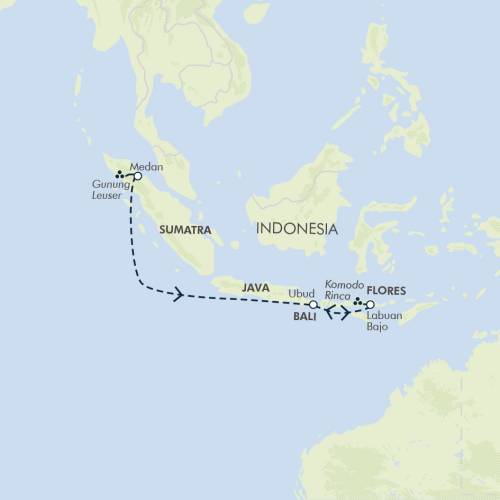
Land Only
- Start City: Medan
- End City: Ubud
Land Only Itinerary
Depart London
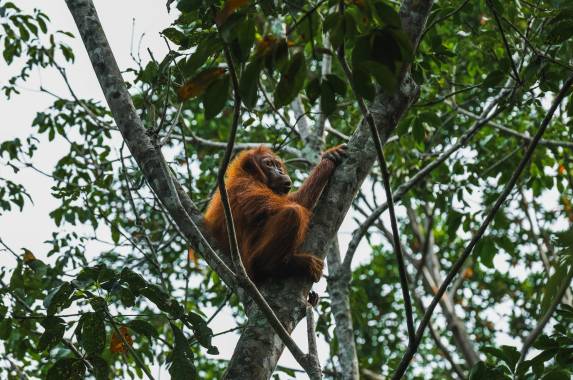
Meet the tour leader at the airport at 9am (subject to change – see Final Joining Instructions) and then the rest of the group (it is normally possible to meet the tour leader at our pre-tour hotel at 7.30am and go with them to the airport to meet the rest of the group – though this needs to be arranged beforehand). From the airport, we drive to Bukit Lawang (approximately four to five hours) on the edge of Gunung Leuser National Park, stopping for lunch on the way.
The rest of the afternoon is free to relax and explore the village. Bukit Lawang is one of the most accessible places to spot orangutans, thanks to an orangutan conservation programme that has been operating on the eastern edge of the park since the 1970s. The Gunung Leuser National Park is one of the final orangutan strongholds, with more than 5,000 thought to be living in the wild. Sumatran elephants, Sumatran rhinos and Sumatran tigers all live in the park, though very rarely seen. The village is attractive, built along one side of the river; relaxing at the riverside, it is not uncommon to see wild orangutans come to the water to drink.
Welcome dinner: From 2026, every departure of this trip includes a welcome dinner at the start of the adventure.
Accommodation: Eco Lodge Bukit Lawang (or similar)

This morning, we head into Gunung Leuser National Park, which is one of the two remaining habitats for Sumatran orangutans. This is one of the largest national parks in the world and we spend time with our guide and have an opportunity to explore the trails, searching for orangutans and other wildlife. The hike itself is a leisurely couple of hours and there is a good chance of seeing Thomas’s leaf monkeys and long-tailed macaques plus, hopefully, one of the orangutans who inhabit the forest. Our hike ends at the one-time feeding station, where we have an improved chance of spotting orangutans.
Accommodation: Eco Lodge Bukit Lawang (or similar)
This morning, we return to the old orangutan rehabilitation centre. Those who want will then venture further from the park headquarters, discovering the flora and fauna of the park, and continuing our search for orangutans and other wildlife. The park hosts approximately 700 different animal species: more than 175 mammals, including Thomas’s leaf monkeys, macaques and gibbons; 320 birds; 190 reptiles; and amphibians. Other mammals include Sumatran elephants and the elusive Sumatran tiger and rhinoceros, although the last is unfortunately facing imminent extinction. We are unlikely to encounter these shy animals. This excursion lasts approximately six hours, including time spent at the feeding station, and can be taxing given the steep, muddy terrain and hot and humid climate. Reasonable fitness is required and, therefore, completely optional. For anyone who chooses not to undertake the jungle hike, the rest of the day is at leisure to relax at the lodge.
Accommodation: Eco Lodge Bukit Lawang (or similar)
This morning, we explore the cultural side of Bukit Lawang. Following a walk through the village, we head to a local house where we watch an Indonesian cooking demonstration by one of the villagers. This is followed by a homemade local lunch. In the afternoon, we return to Medan (approximately four hours) where we spend the night before our early morning flight tomorrow.
Accommodation: Aryaduta Hotel (or similar)
We fly to Bali via Jakarta. We aim to catch an early morning flight with good connections to minimise travel time but this may not always be possible and we may have to take a later flight. If all goes as planned, we arrive in Bali in the early afternoon and transfer to our hotel in Sanur near the beach. The rest of the day is free to relax and plan any optional activities for tomorrow.
Accommodation: Swastika Bungalows (or similar)

Today is a free to enjoy Sanur. There are numerous options both on land and water whether you’re feeling active, want to take in culture or just relax on a nearby beach. Some of these options include a full-day temple tour, downhill biking tour, rafting or a Bali village tour.
Accommodation: Swastika Bungalows (or similar)
Today we fly to Labuan Bajo at the western tip of Flores island. This town is the main entry point into Komodo National Park and, as such, has been growing in popularity as a tourist destination. We aim to catch the afternoon flight, which means we leave for the airport around 12.30pm and arrive at our hotel in Labuan Bajo later this afternoon.
Accommodation: Puri Sari Hotel (or similar)

Komodo National Park, established in 1980, is comprised of islands and the surrounding sea and includes mangrove forests, seagrass beds and colourful coral reefs. The three main large islands are Komodo, Rinca and Padar although many smaller islands come within the park boundaries.
Boarding the boat early, we set sail for the next three days. Our first destination is Rinca, which we visit after lunch. Rinca is one of the islands that houses Komodo dragons but is also home to wild pigs, buffalos and birds. Going ashore, we go on a trek accompanied by a local island ranger to look for Komodo dragons in their natural environment.
Afterwards, we return to the boat and set sail for Padar, where we go snorkelling in the pristine waters. In the late afternoon, we can walk to a hilltop to watch sunset above the national park.
Accommodation on the boat is fairly basic and is a mix of bunks and mattresses on deck.
Accommodation: Boat

This morning, we head to Komodo island. Upon arrival, we trek to Banunggulung, the riverbed where the dragons used to be fed fresh goats (until the mid-2000s). The hike takes us through spectacular scenery and there are many unusual plants along the way. There are about 2,000 Komodo dragons on the island plus wild boar, deer and buffalos. There is also good birdwatching with cockatoos and Gosong birds among others.
Following this, we visit Pink Beach where we have time to snorkel with good chances of seeing parrotfish, clownfish and, with a bit of luck, various other sea creatures including sea turtles. There is ample time to swim and snorkel and enjoy the beach before we head towards Manta Point, so-named as giant manta rays, some with a wingspan of 13ft (4m), are regularly seen here. Our final leg today takes us to Gili Laba Island, where we drop anchor for the night.
Accommodation: Boat
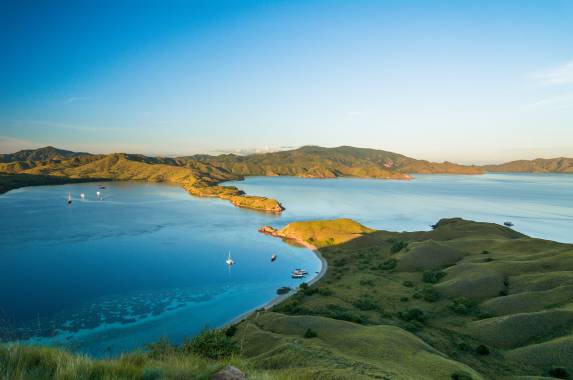
Those who wish can rise before dawn to visit a viewpoint on Laba Island to watch the sunrise.
Later on, we can snorkel more around Laba Island before setting sail again. Time permitting, we make one final snorkelling stop at Kanawa Island on the way back to Labuan Bajo. Returning to Labuan Bajo, we transfer back to our hotel for the night.
Accommodation: Puri Sari Hotel (or similar)
We fly back to Denpasar (flight times can vary) and drive (approximately two hours) to our final destination, Ubud, surrounded by rice fields and temples.
Ubud gets its name from the Balinese word ubad (medicine); the town was originally important as a source of medicinal herbs and plants, but these days is known for its artistic community, awash with art workshops and galleries. The history of Ubud can be traced to the eighth century, when a Buddhist priest came to Bali from Java. He meditated at the confluence of the two Wos rivers at Campuan, just west of the modern town centre. A shrine was established and later expanded by Nirartha, a Javanese priest who is regarded as the founder of Bali’s religious practices and rituals as we know them today. When Ubud became a Dutch protectorate at its own request, the colonialists interfered little, allowing the traditional arts and culture of the area to remain relatively unchanged. From the 1930s onwards, Western artists and intellectuals arrived and furthered the local art scene, among them Charlie Chaplin and HG Wells. Ubud is still a haven for literati, glitterati and art collectors.
Accommodation: Ananda Cottages (or similar)
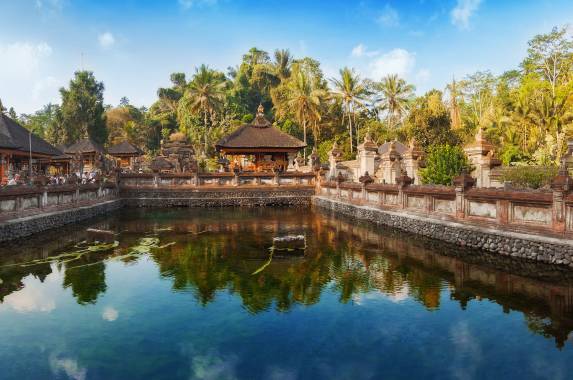
Our first stop on our tour of central Bali is the Kintamani area, where we go on a 3mi (4.5km) hike from the rim of the Batur caldera, descending through black lava fields. We can learn more about the volcano and enjoy views over the crater and surrounding area.
Our tour continues to the Tampaksiring area where we visit Gunung Kawi Temple. Set amid rice terraces, this 11th-century temple features 10 rock-hewn candi (shrines) carved into the cliff itself. They stand at 23ft (7m) and combine both Hindu and Buddhist attributes. The descent to the candi involves numerous stairs (which we also have to climb back up!). After this, we can visit Tirta Empul Temple, known among Balinese Hindus for its holy waters, which are believed to wash away bad spirits. The final stop of the day is Tegalalang for sweeping views over paddy fields.
Accommodation: Ananda Cottages (or similar)
Today is free to wander through the vibrant streets of Ubud enjoying the cafes, shops, temples and theatres or go on another optional trip exploring other parts of the island. Your tour leader can advise you on how best to spend your time.
Accommodation: Ananda Cottages (or similar)
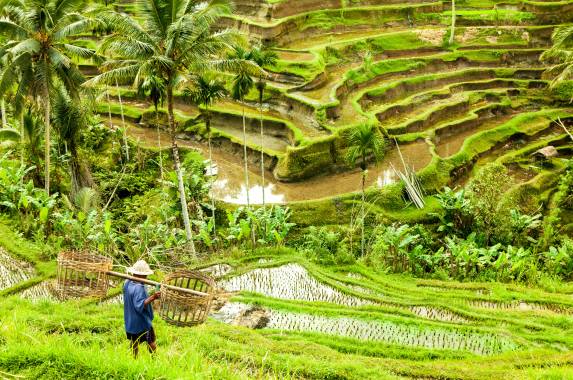
The trip ends after breakfast. If you’d like more time to explore this beautiful part of the world, speak to your sales representative. Alternatively, join our post-tour extension to the Gili Islands, where white sands and a slice of paradise await.
Trip ends after breakfast for Land only clients. Those on the group flights will be taken to Denpasar airport in time for their flight home.
Post-trip Extensions
Bali Island Extension
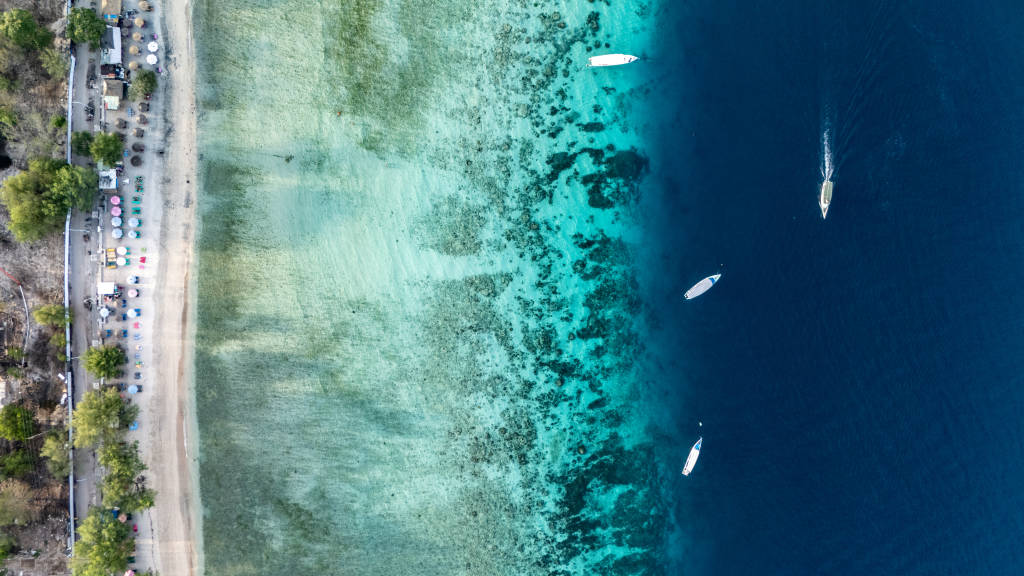
Extend your adventure with additional nights on your chosen island: Gili Trawangan, Gili Meno or Nusa Penida.
Whichever you choose, a tropical paradise awaits: white sands, palm trees, and warm waters teeming with rays, sharks and other marine life.
Spend your time snorkelling, diving or just relaxing by the turquoise sea and taking in the atmosphere. Our extensions include hotel pick up, transfer, fast boat and meet and greet services at each ferry port, plus as many days accommodation as you wish.
On your return, hotel pick up, fast boat transfers and a meet and greet service are included, either taking you to Ubud, a south Bali hotel, or to Denpasar Airport. If you have a same day flight connection, we advise this to be after 8pm.
Speak to your sales representative for more information and to discuss accommodation choices.
Accommodation
Hotels and boat
We spend 11 nights in hotels and two nights on the boat in Komodo National Park.
The nights on the boat are idyllic as we anchor in quiet bays but please be advised the accommodation is basic. Accommodation is a mixture of bunks in cabins and mattresses on deck with shared bathrooms. The reason we spend two nights on the boat is to maximise wildlife viewing around the islands.
Worth knowing
- The hotel in Bukit Lawang only has cold water, but as outside temperatures are hot this is refreshing.
- Single supplements are available (on request) for 11 nights only. The single supplement does not apply for the two nights spent on the boat in Komodo National Park. Please advise at the time of booking if you would like to request a single supplement.
Single supplement from £ 320
Food & Drink
All breakfasts, four lunches and two dinners are included.
Food is cheap in Indonesia and you can generally avoid the spicier food if you wish. Western food is available in Ubud and Sanur though it is well worth trying the local cuisine. In more touristy areas, especially Ubud, there are many food options and some fantastic restaurants and coffee shops catering for all tastes and requirements.
Indonesian cuisine is generally fairly simple, with rice as the main staple, though noodles are also common, accompanied by dishes created with various spices including cloves and chilies plus coconut and lemongrass. Fish is popular but meats are also common.
Peanuts are a popular ingredient especially in dishes such as sate or gado gado and you should inform your tour leader if you have a peanut allergy. Nasi (rice) and mie (noodles) are very popular, especially the staple dish nasi goreng (fried rice). Quite often tea or water (aqua) is drunk with a meal. Beer is not always cold and coffee is unfiltered and usually very sugary.
Vegetarian food is available in Indonesia; however, the concept of vegetarianism can be misunderstood so if you are a vegetarian, please be clear and state that you don’t eat meat, chicken or fish. Please advise at time of booking if you have any dietary requirements.
Transport
Throughout the trip, we use a private coach usually with air conditioning. Road conditions, in many cases, are not very good and traffic is a constant problem in Sumatra and Bali. On most driving days, the average travelling time is between four and six hours. We also use a boat when visiting Rinca and Komodo islands. All bookings on domestic flights are made in economy class. Domestic flight schedules in Indonesia can change so we cannot guarantee we are using flights at the preferred times stipulated in the itinerary.
The luggage allowance on the domestic flights is one checked bag per person of maximum 44lb (20kg).
Weather & Seasonality
Indonesia has an equatorial monsoon climate with the weather remaining similar throughout the year. It is hot and humid; temperatures range from 23C-33C (73F-91F) during the day and rarely drops below 20C (68F) at night. In the mountains, temperatures are much cooler; on the coast, sea breezes usually keep temperatures comfortable. In most parts of Indonesia, the rainy season falls between late October and early May, though rain occurs throughout the year. Rain tends to come in sudden tropical downpours.
Joining Instructions
Key information
Start hotel: Eco Lodge Bukit in Lawang, Jalan Besar Jl. Bukit Lawang, Sampe Raya, Kec. Bohorok, Kabupaten Langkat, Sumatera Utara
Phone: +62 812-6079-983
Recommended arrival time: This trip starts at the arrival airport. The group will all meet with the leader for the transfer.
Airport: Medan Airport
On arrival
We provide one group arrival transfer from the airport, which is timed to coincide with the arrival of a chosen flight from London, UK. You may join this transfer at no extra cost, provided you can be at the airport before the transfer leaves. It is also possible to meet the tour leader at our pre-tour hotel at 7.00am and go with them to the airport to meet the rest of the group – though this needs to be arranged beforehand. Speak to your sales representative for the group arrival transfer times. From the airport, we drive to Bukit Lawang (approximately four to five hours) on the edge of Gunung Leuser National Park stopping for lunch on the way.
Please note, if you are not able to join the group arrival transfer or be at the Medan hotel by 7.00am you would need to pay for an additional transfer locally to catch up with the group. As this is over four hours, the transfer will be expensive.
Catching your return flight
There’s a group departure transfer to the airport for customers who Exodus booked onto a chosen flight to London, UK. Please speak to your sales representative if you wish to join. If the group departure transfer does not suit your flight time, speak to your sales representative to arrange an alternative transfer.
Full joining instructions including local emergency numbers will be sent to you as part of our Final Joining Instructions. If you do not receive these at least a week before departure, or require them earlier please contact our office or your travel agent.
Location start: Medan
Location end: Ubud
What To Take
Essential Equipment
- Casual clothes. As it is generally hot and humid, light cotton (neutral colours as this will make animals and birds more approachable) are recommended for most of the trip, though it will be cooler if there’s a bit of wind and you should bring a light jacket/jumper with you. Please note, Indonesia is a Muslim country so modest dress is required on this trip when visiting holy sites and rural areas (ie legs, shoulders and upper arms covered plus a headscarf for women).
- Sandals are useful as they are cooler and are easier to take off when visiting temples
- Torch (flashlight)
- Strong walking shoes for the jungle walks in Gunung Leuser National Park and Komodo National Park
- Sunscreen, sun hat, sunglasses, lip balm
- Swimwear
- Small backpack – you carry your own gear during the day walks, You also use this as your main luggage when staying on the boat. Main luggage is safely stored at the hotel in Labuan Bajo during this time
- Lightweight waterproof jacket or an umbrella
Water included: Plastic bottles are a big issue in many countries where recycling isn’t yet widely available; they often end up in landfill or get burned. Both processes are harmful to the environment and we would like to reduce our impact here. For your trip, we provide an alternative to single-use plastic bottles to reduce the plastic used. This means that safe drinking water will be available throughout; all you need to do is bring a bottle to refill along the way. Please add this to your packing list.
If you have any space in your luggage, please check out our partner Pack for a Purpose (www.packforapurpose.org) to identify items needed by local schools and medical clinics. Your Tour Leader will happily assist with your donation.
Optional Equipment
- Rash vests or swimsuits that are like shortie wetsuits as they can protect you from the sun while snorkelling
- Binoculars
- There are several opportunities to snorkel and you may want to bring your own mask and snorkel
Practical Information
Visa
Indonesia
Many nationalities can apply for a 30-day visa on arrival at Jakarta, Medan, Surabaya, Batam, Bali and Yogyakarta at a cost of 500,000 Indonesian rupiah (approximately US$33). Please note, visa requirements often change and it is your responsibility to obtain any required visas for this trip. Therefore, we recommend that you check with the nearest embassy or consulate of your chosen destination(s), including any countries you may be transiting or transferring through.
Some local governments provide guidance on what visas their citizens need. To help, we’ve gathered a selection of useful links below.
- Australia: www.smartraveller.gov.au/destinations/asia/indonesia
- Canada: www.travel.gc.ca/destinations/indonesia
- United Kingdom: www.gov.uk/foreign-travel-advice/indonesia/entry-requirements
- USA: www.travel.state.gov/content/travel/en/international-travel/International-Travel-Country-Information-Pages/Indonesia.html
Vaccinations and Health
Indonesia
There are no required vaccinations. However, you may want to consider vaccinations for hepatitis A, polio, tetanus, typhoid, cholera, hepatitis B, Japanese encephalitis, rabies and tuberculosis. There is also a high risk of malaria in Irian Jaya (Papua) and low risk in Bali, Lombok, Java and Sumatra. Please speak to your doctor or travel clinic for the best course of action on all the above.
You will also need a yellow fever vaccination certificate if you’re arriving from a country with risk of yellow fever transmission.
Additionally, dengue and zika fevers are known risks in places visited. Both are spread by mosquitoes. There are currently no vaccines or prophylaxes available; therefore, we recommend you take the usual precautions to avoid mosquito bites.
All Indonesia Arrival Card
The All Indonesia Arrival Card is a health and customs declaration that must be completed three days (72 hours) prior to arrival.
• Visit allindonesia.imigrasi.go.id
• Switch the website to English → select “Foreign Visitor”
• Fill in the required details:
– Personal: nationality, full name, date of birth, passport number & expiry date, contact information
– Travel: arrival/departure dates, e-Visa (if applicable)
– Transport & Accommodation: airport/port of arrival, flight/ship details, hotel or residential address
– Health & Customs: recent symptoms/travel history, items to declare (e.g., animals, electronics, baggage)
• Submit the form to receive a QR code
• Present the QR code (printed or digital) along with your passport upon arrival
Travelers must still obtain the appropriate visa for their stay. Travelers with visa exemptions are still required to complete the All Indonesia Arrival Card.
Local Time
Indonesia's time zone: Asia/Jakarta (UTC +07:00)
Electricity
Indonesia's electricity: Plug types C (two round pins) and F (two round pins) – 230V, 50Hz
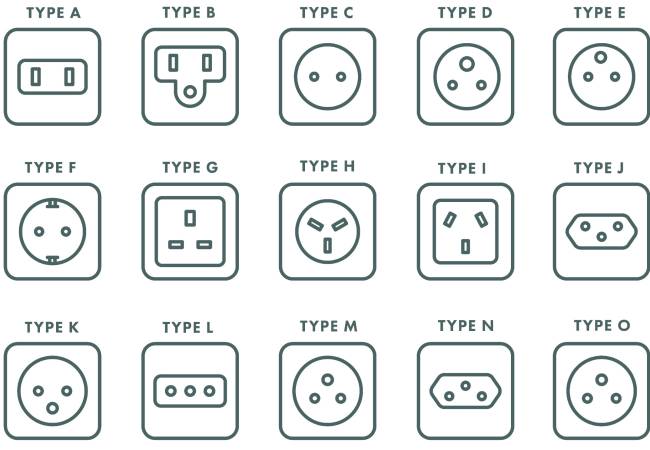
Money
Indonesia's currency: Indonesian rupiah (IDR)
ATM Availability
ATMs are widespread in Indonesia and the easiest way of obtaining money. Generally, it is possible to withdraw a maximum of 2m Indonesian rupiahs (US$130) in one go (a few ATMs will give out 2.5m rupiahs). Credit card acceptance is not widespread at places we visit, except for Ubud and Sanur in Bali. As you will probably carry much of your money in cash, we strongly recommend using a money belt.
Extra Expenses & Spending Money
While it is possible to obtain Indonesian rupiahs before arriving in Indonesia, the exchange rate outside the country tends to be much lower than within Indonesia. Within Indonesia, the exchange rate can vary greatly between one town and the next depending on how touristy it is.
You need about 3m-4m (US$200-US$260) for all meals not included, which allows you to eat well. Apart from the food, allow money to cover soft drinks (more if you like a beer/alcohol) and souvenirs. Some temples and sights charge a nominal camera fee, generally:
- 50,000 rupiahs (US$5) for photo cameras
- 150,000 rupiahs (US$15) for video cameras
We use domestic flights to get from Sumatra to Bali to Flores and back to Bali. In the past, some groups have had to pay an airport tax at the airport, others haven’t. Still, be prepared to pay an airport tax for the various flights. The rates may change but, as a guide, budget for 60,000 rupiahs in Medan, 75,000 rupiahs in Denpasar and 22,000 rupiahs in Labuan Bajo (in total about 160,000 rupiahs/US$11).
There are several optional activities, which your leader can arrange for you if you wish. They are subject to schedules and availability; your leader will let you know what is available and the exact local costs. It is also possible to arrange many of these activities independently if you prefer.
Bukit Lawang
- Jungle hike: 305,000 rupiahs (US$20)
Sanur
- Half-day Uluwatu temple tour: 535,000 rupiahs (US$35)
- Downhill biking tour Kintamani-Ubud: 610,000 rupiahs (US$40)
- White-water rafting: 610,000 rupiahs (US$40)
- Bali village tour: 610,000 rupiahs (US$40)
- Castaway cruise: 1.5m rupiahs (US$100)
Ubud
- Full-day temple tour: 610,000 rupiahs (US$40), less for individual temples
- White-water rafting: 610,000 rupiahs (US$40)
Tipping
With the increase in tourism, tipping has become customary in Indonesia. To make things easier, the leaders will organise a tipping kitty to tip local guides, hotel porters and drivers.
As we use two separate leaders, the tipping kitty will be split in two. The leader collects around 800,000 rupiah (about US$55) for the trip. This is, of course, optional and only intended to make things easier for you.
We use two leaders on this trip. If you feel your leader has performed well over the course of your trip, you may want to show your appreciation of their services. The sum you choose to give is entirely personal but, as a guide, a reasonable starting point is 46,000-76,000 rupiahs (US$3-US$5) per person per day. The tipping kitty explained above is entirely separate from any contribution to the tour leader. Our local staff are paid fairly for their work.
Sustainability and Impact
As a certified B Corp, we’re on a mission to improve our social and environmental impact across all our adventures.
We do this through our innovative Thriving Nature, Thriving People plan.
This ‘nature positive’ approach is designed to help nature and communities thrive in harmony through practical solutions, such as reducing carbon and waste on our trips, supporting conservation projects through the Exodus Adventure Travels Foundation, and rewilding 100 square metres for every Exodus traveller.
Important Information
Your Safe Participation
When booking this trip, you should be confident in your ability to participate in all activities described in these Trip Notes. If you have any doubt about your suitability, please call us and ask to speak to one of the experts on this itinerary.
Although our leaders are well trained to deal with different capabilities, if they have any concerns about someone’s ability to safely take part in an activity, or their impact on other people’s enjoyment, we authorise them to take necessary action which, in some circumstances, may involve asking someone to miss that activity.
By booking this trip you agree to our Booking Conditions which clearly state that our leaders have the authority to do this. In these rare instances we will ensure anyone sitting out is safely provided for and offered alternative options where possible. Refunds will not be provided for activities missed and customers may be liable for additional costs incurred.
Seatbelts
All vehicles used by us should be equipped with working seatbelts, except where approved by us based on the vehicle type or journey. Wherever seatbelts are available, we require our customers to use them for their own safety, even where it may not be a legal requirement.
How to Book
Speak to our friendly team of experts to plan your adventure:
- Check availability: our website shows real-time availability or contact our team by phone, email or live chat.
- Hold a space: You can provisionally hold a space to give you time to finalise your travel plans.
- Confirm your booking: Payment of a deposit will complete your booking and secure your place on the trip.
After booking
You will receive a confirmation document and invoice, which includes extra information and guidance about your travel arrangements. Our dedicated Customer Operations team will help you with any pre-travel questions or arrangements and can easily add extensions or extra accommodation to your booking. Final Joining Instructions will usually be sent out two to three weeks prior to departure.
Adding transfers to your booking
If you have arranged your own flights and would like to add transfers to your booking, please provide your arrival and departure details to our Customer Operations team around four to six weeks before departure.
- Where free transfers are included, they are available for any flight but can only be added to your booking once we have received your flight schedule.
- Where group arrival and departure transfers are available, these operate at fixed times. You will need to arrive in time to meet the scheduled transfer. If the timings don’t align with your travel plans, our team can arrange private transfers once they receive your flight schedule.
Trip Note validity
Trip notes may be updated after booking; if any updates significantly impact the inclusions or itinerary you will be advised in writing. A link to the most up-to-date Trip Notes will be sent out with your Final Joining Instructions before departure.
The information in these Trip Notes is given in good faith. All holidays can be subject to unexpected changes, and occasionally it may not be possible to follow the itinerary as planned. In these circumstances we will make the best-possible alternative arrangements that maintain the integrity of the original itinerary.

